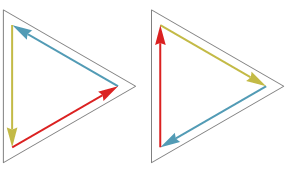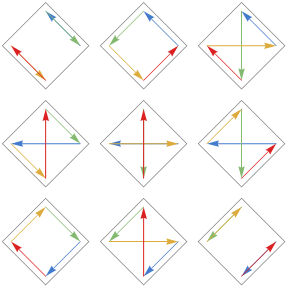A derangement (or complete permutation) of a set is a permutation that leaves no element in its original position. The number of derangements of a set with n elements can be computed recursively using this formula:
D(n + 1) = n (D(n) + D(n–1))
Using the principle of inclusion and exclusion, we also get:
![]()
Here are some diagrams that represent the derangements of sets with n elements.
3 elements, 2 derangements:

4 elements, 9 derangements:

5 elements, 44 derangements:
![[ derangement 5 ]](derangement5.png)
The counts are also known as subfactorials, with notation !n.
Derangements also count n×n chessboards with n non-attacking rooks that avoid the main (NW–SE) diagonal.
D3 = 2:
![[ derangement chessboard 3 by 3 ]](derangementboardrook3.png)
D4 = 9:
![[ derangement board 4 by 4 ]](derangementboardrook4.png)
D5 = 44:
![[ derangement board 5 by 5 ]](derangementboardrook5.png)
Derangement formulas from Fred S. Roberts, Applied Combinatorics, Prentice-Hall, 1984.
Designed and rendered on various weekends over the years using Mathematica versions 3.0, 6.0, 7.0, and 13.2.
© 1996–2026 by Robert Dickau.
[ home ] || [ 2023-02-11 ]